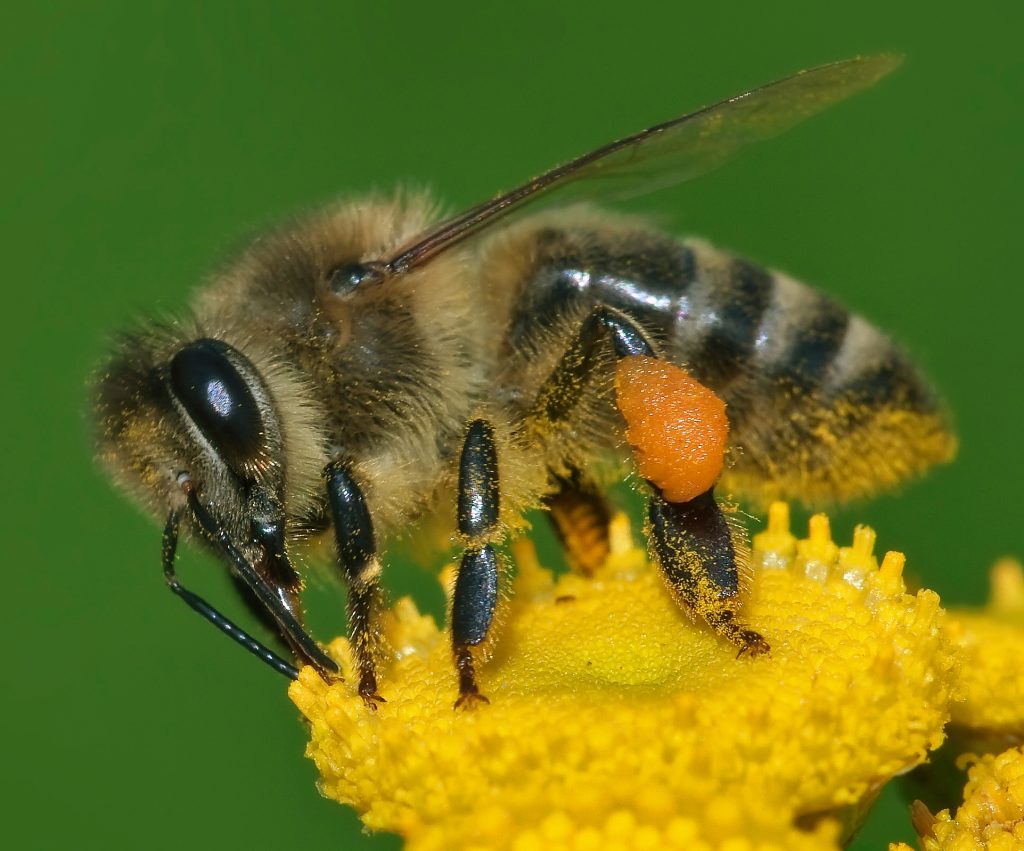Appreciating bees as pollinators.
Moving away from sugar-feeding and intensively farming bees for their honey.
.
Earlier this month, Charles Sinclair of the Sid Valley Biodiversity Group visited the Four Elms fruit farm – where they also look after bees:
Knowing that there were problems with pollination worldwide, (with some places in China now having to hand pollinate their fruit crops), I was keen to know if pollination was an issue for a local fruit grower. Luckily there is an easy solution to ensuring good pollination. There are also other subtle techniques that Richard uses on his farm.
The easy solution is to keep honey bees in the fields. Currently there are about 40 permanent hives on the farm run by a professional bee keeper. When a fruit crop is in full bloom, it will only take two to three days of good weather to fully pollinate the flowers. Because the bees are there all year around many local gardens and wild plants will benefit from the presence.

Sidmouth biodiversity: How to pollinate 70 acres | Sidmouth Herald
This sounds a very good idea – as looked at by Hugh F-W who returned to our screens earlier this week:
Hugh Fearnley-Whittingstall (@HughFW) / Twitter
River Cottage Reunited: Episode 1 – All 4
And a highlight was looking at how we traditionally ‘make honey’:
And then between baking sourdough crumpets and brewing kombucha, he met with a chap called Matt Somerville (but inevitably dubbed “the bee whisperer”) to hollow out a log and fake the sort of natural beehive found in ancient trees.
Now, very few of us are going to construct one of these rocket-shaped bee-friendly dwellings in our gardens, but the sequence was instructive about bee welfare and the way in which the insects are sugar-fed and intensively farmed for their honey.
Matt Somerville is a member of the Natural Beekeeping Trust:
The Trust puts bees first:
We encourage attention to the real nature of bees, their nesting preferences, their forage needs and their all-encompassing purpose.
And here is Matt talking from the West Country:
Matt Somerville – Bee Kind Hives‘
Free Bee’ suggests a fundamental realignment in the way humans interact with bees. Our bee population is sick and failing – could this be a solution?
Finally, a piece from the Resurgence magazine:
Thomas Seeley, the author of Honeybee Democracy, says we need to acknowledge that the bee is the best beekeeper. He suggests that the bee knows what it wants and that we need to listen. He has coined the term “Darwinian beekeeping”, whereby we allow natural selection to choose the right bee instead of trying to select bees that may not be as well adapted as we think.
Matt Somerville’s bee-kind hives, designed for minimum intervention, reduce stress and disease in the bees. Many beekeepers are well-intentioned and want to help bees; a shift towards bee-kind log and freedom hives that are insulated, placed high in trees or on strong stilts designed to avoid too many interventions, may be just what the bees need. Matt runs courses to help aspiring natural beekeepers make their own hives.
Bees evolved over millions of years, and the threats and challenges they now face are complex; bee-kind hives may be one way of helping. The highly evolved super-organism of the swarm is able to choose what it needs. With a shift towards this form of sustainable beekeeping, we can take a step back and trust while the bee colony is ‘rewilded’, regaining resilience and beginning to thrive once more.